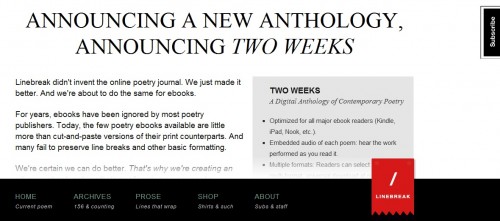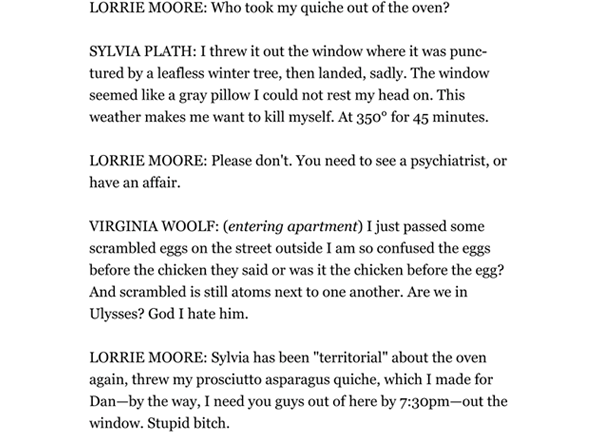Reading as a Comfort
The suicides and untimely deaths of friends and family have been piling up the last ten years. I had a close friend when I lived in Florida who was a city utilities worker. He was into kung fu movies and karate and beach volleyball and very unlucky with women. He met a woman after he was diagnosed with leukemia, and they married, but it must have been hard to be married to a terminally ill person, and she left him in the end, but before the end. It seemed unexcusable to me that she left him before the end, but then she was the one who was changing the bedsheets and holding his head over the toilet and watching him turn skeletal and lose teeth. READ MORE >
Over at CNN they are publishing the poetry of the Arizona shooter. Here is the first poem, titled “Meat Head.”
Two Weeks: An Anthology of Contemporary Poetry
The editors of Linebreak are creating an all-new, ebook-only anthology of contemporary poetry. Beginning today they are accepting submissions which they will compile and design as a multi-format ebook. On January 25th, they will publish it. Details, here. Send your submissions here. Hop to it!
January 12th, 2011 / 12:00 am
Michael Martone : Michael Martone : Michael Martone
:
Michael Martone on William Gass, the most important contemporary fiction writer. Of the lessons he learned from “In the Heart of the Heart of the Country”, he says: READ MORE >
the taking and passing along 11
11. For all you punk-asses that need writing prompts, there is a weird little flash contest coming up over at Flash Fiction Chronicles.
5. Oh, flash fiction is:
“…a place for writers to talk ABOUT fiction, and its feats in that weird mysterious way that fiction talks beyond the story on the page.”
Deb Olin Unferth
Take that, you flash-bastards. You’re the same people that don’t like olives, microchips, inward blushes, hall mirrors, and other small things.
1. Rock and Roll is finally dead.
99.
7. Back when a professor visited my MFA university and taught one class, a class about HER. She made us buy and read all of HER books. WTF? I thought divas were for music and acting. Memo to writers: No one gives a damn. Well…Nother time a reader visited and insisted we bring her ribs. She was all, “I’m in Alabama, you WILL feed me ribs.” A graduate student had to drive his turd-colored Ford Escort all night. There’s no rib place open way late in sleep-ass little Tuscaloosa, Alabama. Ends up they gave her Chili’s ribs, not ribs at all, unless you enjoy pale under-belly of cardboard. Diva behavior from writers? From writers! Do tell:
{LMC}: A Conversation with Terrance Hayes
Ploughshares has conversations with each guest editor. Below are two parts of the conversation between Kim McLarin and Terrance Hayes, the guest editor of the issue we are currently reading. Some highlights are Hayes discussing not expecting to win the NBA, how he enjoys his own company, universality and more. Terrance Hayes is a great writer, National Book Award winner, human being and all but I think we also have to talk about his fineness. Good lord. Enjoy. Also, later this month, I’ll post an interview with Ploughshares editor Ladette Randolph. In the meantime, what is your favorite piece, so far, in the Winter 2010/11 issue?
Part 1
A Conversation with Andrew Ervin, author of Extraordinary Renditions
 MINOR: Extraordinary Renditions does a thing that some say fiction ought not do — it assumes the points of view of characters from different cultures than the writer’s. Writers used to do this all the time, but it seemed to get controversial around the time of the civil rights movement — the furor in some quarters over Styron’s The Confessions of Nat Turner, to give one example, and the subsequent defense by James Baldwin on the grounds that Styron was doing a thing fiction writers have an obligation to do, by putting himself “in the skin of Nat Turner.”
MINOR: Extraordinary Renditions does a thing that some say fiction ought not do — it assumes the points of view of characters from different cultures than the writer’s. Writers used to do this all the time, but it seemed to get controversial around the time of the civil rights movement — the furor in some quarters over Styron’s The Confessions of Nat Turner, to give one example, and the subsequent defense by James Baldwin on the grounds that Styron was doing a thing fiction writers have an obligation to do, by putting himself “in the skin of Nat Turner.”
ERVIN: It was never a question to me if I had the right to write from different cultural perspectives. As a writer of immense privilege, I felt it was my responsibility to do so. Not that I was trying to make some sort of grand, dogmatic political statement; there were simply some stories that for various reasons I felt needed telling. Yes, the second of these three novellas, “Brooking the Devil,” uses many of the tropes of the captivity narrative. The relatively new genre of the neo-slave narrative—begun in large part by Styron—is the single most important tradition in contemporary American letters. Where would we be without Beloved and The Wind Done Gone and Flight to Canada? For a white writer like myself to ignore race, and our nation’s racist history (and present) would be unconscionable. READ MORE >
“He shot her, two hours passed (I wonder about those two hours, like, all the time), then he shot himself. It’s a beautiful story.” –the Tyrant on his favorite literary rich kid : “Combining the two most homosexual things in straight America, the prison system and closeted homosexuality” –Mark Leidner on I Love You, Phillip Morris! : And everybody on the new OED site – free till Feb. 5th, use username/password combo trynewoed/trynewoed.
What Do You Mean When You Say “Brooklyn”?

When I visit Brooklyn, there is Brooklyn, and then there is the idea of Brooklyn I have before I visit Brooklyn, and then there is the idea of Brooklyn the people I’m visiting in Brooklyn have of Brooklyn, and then there is the idea of Brooklyn the people I tell I’m visiting Brooklyn have of Brooklyn, and there are the Brooklyn streets and the Brooklyn people and the Brooklyn buildings, and Manhattan is across the river, and there is the idea of Brooklyn as part of New York City, and there is the idea that Brooklyn isn’t a part of New York City, because New York City is Manhattan, and when I read Edward Falco I visit a Williamsburg where it is not safe to walk the streets, and when I visit Williamsburg it is very safe to walk the streets, even alone at night, and when I walk through a neighborhood full of Hasidic Jews walking on a Saturday, the people I’m with tell me how it is to live in a neighborhood of Hasidic Jews walking on a Saturday, but I don’t know anything about what it’s like to be a Hasidic Jew walking on a Saturday, and when I’m with people who like to talk about literature, Brooklyn is a place where everyone talks about literature, but when I’m not with people who like to talk about literature, no one in Brooklyn is talking about literature, and when I read about Brooklyn in newspapers I hear stories about Brooklyn trends, such as it’s cool to have a potbelly, but when I’ve been in Brooklyn, I’ve never met anyone who believes it’s cool to have a potbelly, and what I’m wondering is: What is Brooklyn?, and: What does a person mean when a person is saying Brooklyn to me?, and: If I only visit Brooklyn but never live in Brooklyn, do I know very much about what Brooklyn is?, and: If I lived in Brooklyn but never visited other places, how would I have any idea of what Brooklyn might be without having other places against which to compare Brooklyn?, and: If I grew up in Brooklyn, would Brooklyn be Brooklyn now or the Brooklyn I knew then or both or neither, and: If I didn’t grow up in Brooklyn but I lived in Brooklyn, would Brooklyn be Brooklyn now or the Brooklyn I imagine from then or both or neither, and: If I’ve never lived in Brooklyn, but I frequently visit Brooklyn, is Brooklyn the Brooklyn I visit or the Brooklyn I imagine Brooklyn to be when I’m not there or the Brooklyn I imagine Brooklyn used to be or the thing I think Brooklyn can do for me or the thing I think Brooklyn is doing for other people or none of these things or all of these things?, and: Why is it always I’m wanting to think about my idea of Brooklyn and never I’m thinking about my idea of the place I really live, which seems too out-of-the-way and inconsequential to mean anything to anyone, or even to mention to anyone I meet in Brooklyn, and what does that say about my idea of Brooklyn?



